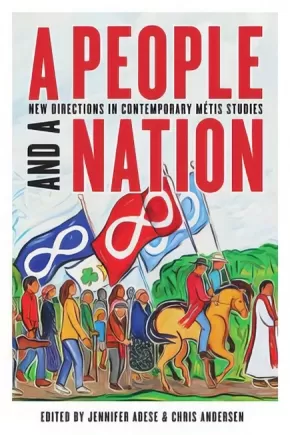Chris Andersen
Chris Andersen (Métis) is the dean of the Faculty of Native Studies at the University of Alberta. He is the author of the award-winning “Métis”: Race, Recognition, and the Struggle for Indigenous Peoplehood, and, with Maggie Walter, co-author of Indigenous Statistics: A Quantitative Indigenous Methodology. He co-edited, with Jean O’Brien, Sources and Methods in Indigenous Studies
Books (2)
Synopsis:
In A People and a Nation, the authors, most of whom are themselves Métis, offer readers a set of lenses through which to consider the complexity of historical and contemporary Métis nationhood and peoplehood. Multidisciplinary chapters on identity, politics, literature, history, spirituality, religion, and kinship networks orient the conversation toward Métis experiences today.
The chapters within are themselves also a reorientation given that the field of Métis Studies has been afflicted by a longstanding tendency to situate Métis within deeply racialized contexts, and/or by an overwhelming focus on the nineteenth century. A People and a Nation confronts such problematic characterizations head on, training a critical gaze on conventional historiographical positionings of the Métis people as a primitive intermediate force that opened up the Canadian West.
A People and a Nation dismantles the impoverished notions that continue to shape political, legal, and social understandings of Métis existence. It is a timely collection that convincingly demonstrates how racialized interpretative frameworks diminish the Métis people and are incompatible with the task of understanding Métis peoplehood and nationhood.
Reviews
Educator Information
This important work will appeal not only to scholars in Métis studies but also to scholars and students of Indigenous studies, political science, sociology, history, and cultural studies, and to policy workers and others seeking a better understanding of the Métis people and the current state of Métis studies.
Table of Contents
Introduction: A New Era of Métis Studies Scholarship / Chris Andersen and Jennifer Adese
1 Peoplehood and the Nation Form: Core Concepts for a Critical Métis Studies / Chris Andersen
2 The Power of Peoplehood: Reimagining Metis Relationships, Research, and Responsibilities / Robert L.A. Hancock
3 The Race Question in Canada and the Politics of Racial Mixing / Daniel Voth
4 Challenging a Racist Fiction: A Closer Look at Métis-First Nations Relations / Robert Alexander Innes
5 Restoring the Balance: Métis Women and Contemporary Nationalist Political Organizing / Jennifer Adese
6 Alcide Morrissette: Oral Histories of a Métis Man on the Prairies in the Mid-Twentieth Century / Jesse Thistle
7 “We’re Still Here and Métis:” Rewriting the 1885 Resistance in Marilyn Dumont’s The Pemmican Eaters / June Scudeler
8 Mary and the Métis: Religion as a Site for New Insight in Métis Studies / Paul L. Gareau
9 Building the Field of Métis Studies: Toward Transformative and Empowering Métis Scholarship / Adam Gaudry
List of Contributors; Index
Additional Information
252 pages | 6.00" x 9.00" | Paperback
Synopsis:
In Daniels v. Canada the Supreme Court determined that Métis and non-status Indians were “Indians” under section 91(24) of the Constitution Act, 1867, one of a number of court victories that has powerfully shaped Métis relationships with the federal government.
However, the decision (and the case) continues to reverberate far beyond its immediate policy implications. Bringing together scholars and practitioners from a wide array of professional contexts, this volume demonstrates the power of Supreme Court of Canada cases to directly and indirectly shape our conversations about and conceptions of what Indigeneity is, what its boundaries are, and what Canadians believe Indigenous peoples are “owed.”
Attention to Daniels v. Canada’s variegated impacts also demonstrates the extent to which the power of the courts extend and refract far deeper and into a much wider array of social arenas than we often give them credit for. This volume demonstrates the importance of understanding “law” beyond its jurisprudential manifestations, but it also points to the central importance of respecting the power of court cases in how law is carried out in a liberal nation-state such as Canada.
Reviews
"This important collection of original pieces focusing on Daniel’s v. Canada and the Supreme Court’s decision will have an impact for years to come. Reader’s will appreciate the diverse areas of expertise found in this volume, including Indigenous leadership, political activism, sociology, law, and anthropology." — Christopher Adams
“Articulate, thoughtful, provocative assessments of how we might assess the Supreme Court’s 2016 decision regarding the Metis People’s legal status in Canada.” — William Craig Wicken
Educator Information
Other contributors: Tony Belcourt, Catherine Bell, Deborah A. Bolnick, Brenda L. Gunn, Arend J.A. Hoekstra, Thomas Isaac, Darryl Leroux, Jason Madden, Brenda Macdougall, Austin W. Reynolds, Rick W.A. Smith, Lauren Springs, D’Arcy Vermette
Table of Contents
Introduction
Ch. 1—Daniels in Context
Ch. 2—Harry Daniels and Section 91 (24) of the British North America Act
Ch. 3—After the Hysteria: Understanding Daniels v. Canada from a Métis Nation Perspective
Ch. 4—Daniels v Canada: A Framework for Redress
Ch. 5—The Other Declarations in Daniels: Fiduciary Obligations and the Duty to Negotiate
Ch. 4—Racism, Canadian Jurisprudence, and the de-Peopling of the Métis in Daniels
Ch. 5—Daniels Through an International Law Lens
Ch. 6—Daniels v. Canada Beyond Jurisprudential Interpretation: What to do Once the Horse has Left the Barn
Ch. 7—Outlining the Origins of “Eastern métis” Studies
Ch. 8—Making Kin in a Postgenomic World: Indigenous Belonging after the Genome
Ch. 9—How We Know Who We Are: Historical Literacy, Kinscapes, and Defining a People
Conclusion: The Multiple Lives of the Daniels Case
Additional Information
336 pages | 6.00" x 9.00" | index, bibliography








